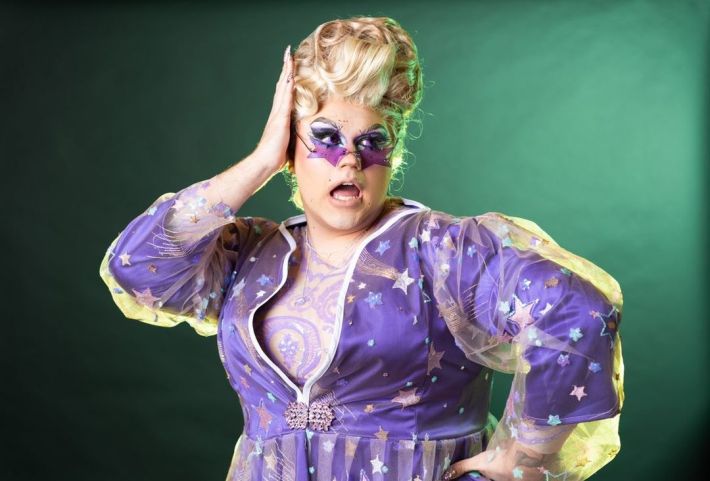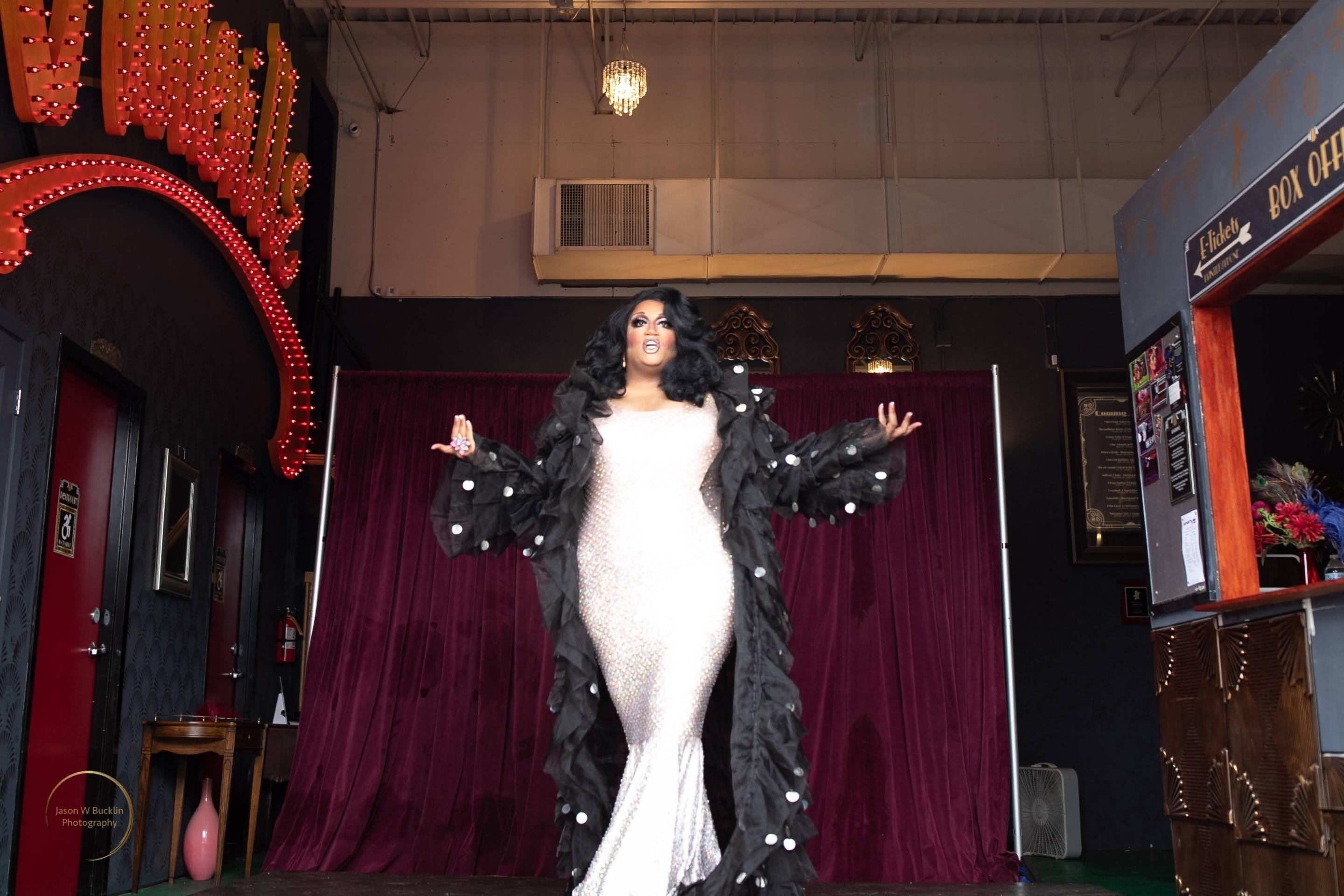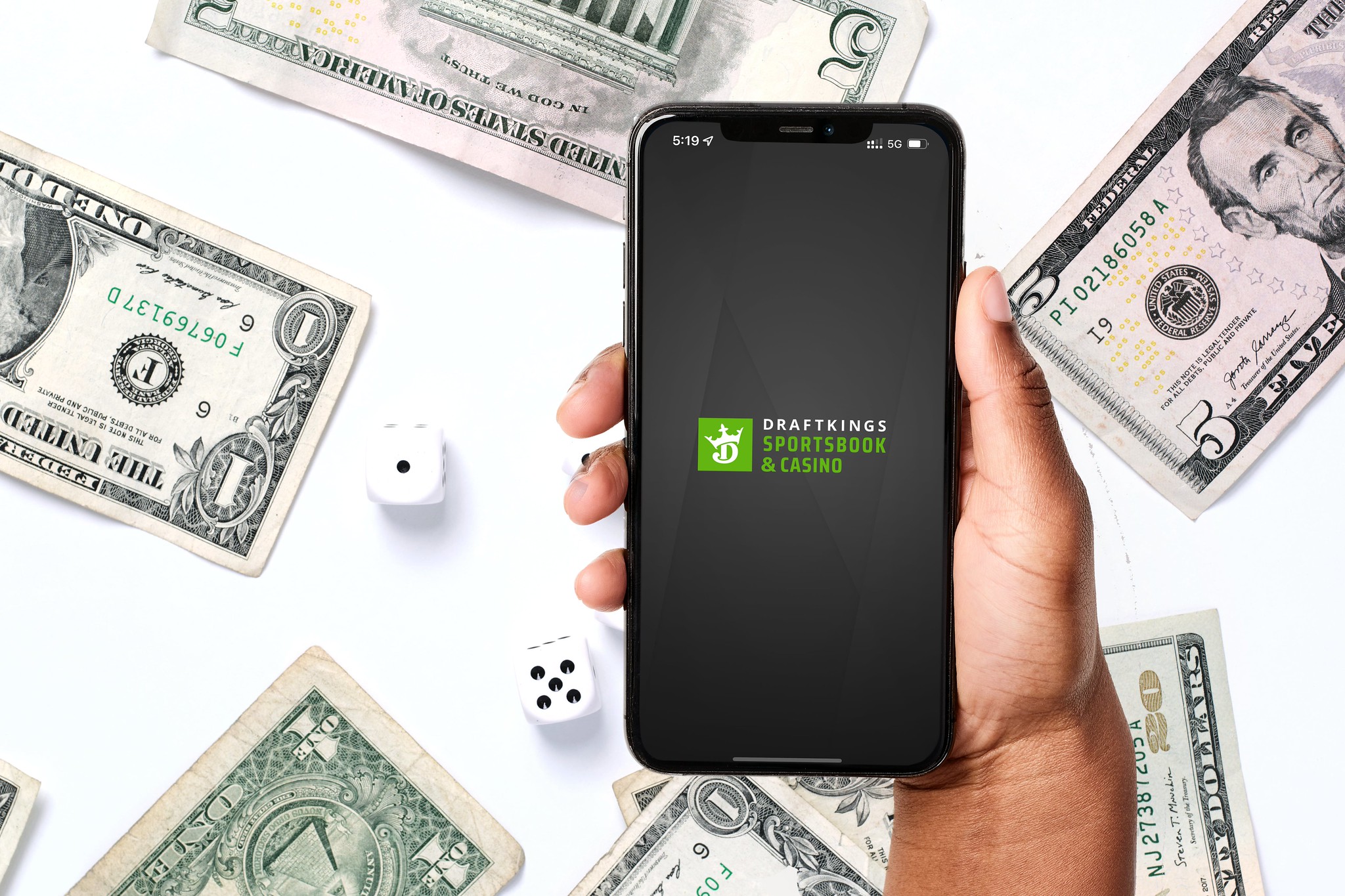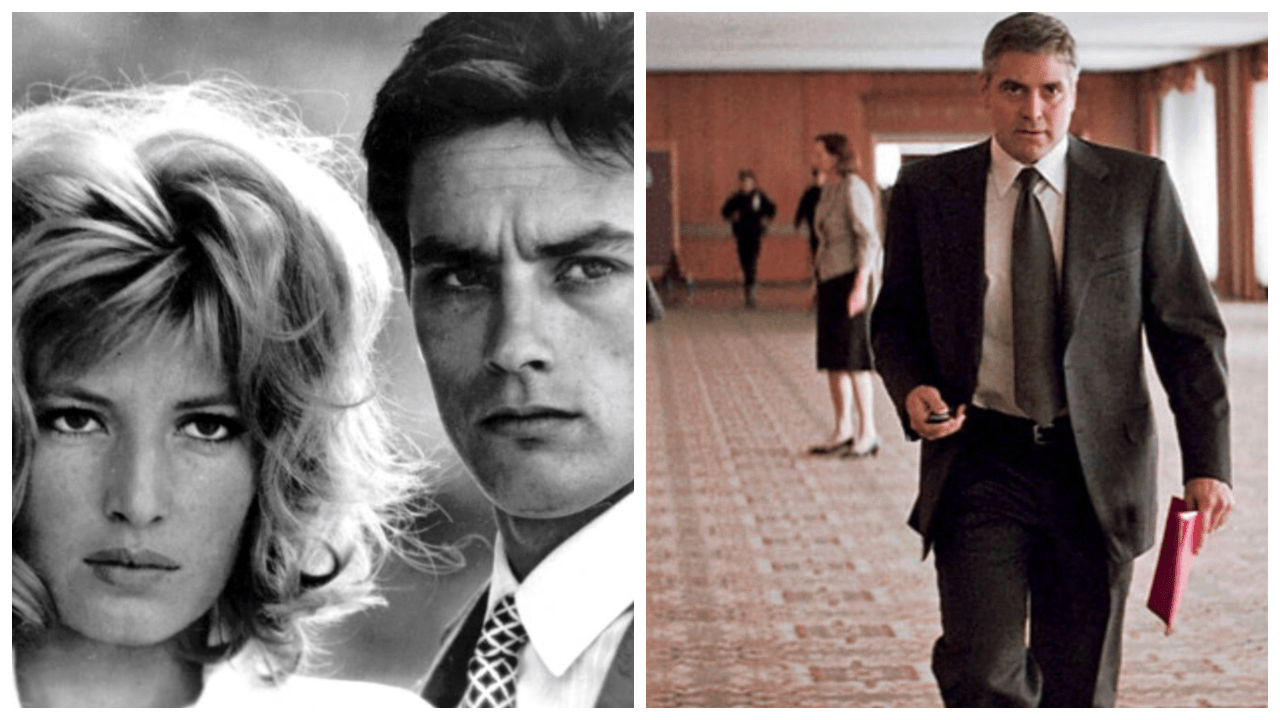When Flip Phone Events got its start in 2012, the Twin Cities drag community was a much different—and much smaller—place.
“Not many people would see drag that often,” says Flip Phone founder Chad Kampe. “You had to go to the Gay 90’s, pretty much, to see any drag back then.”
A decade later, drag is everywhere. Flip Phone operates in six cities around the country, and Kampe and his husband have gone from full-time teachers to full-time event producers. Each weekend, the company hosts a half-dozen drag brunches on downtown Minneapolis rooftops, along with cruises and other special events. Kampe’s company has a silver star on First Avenue, right between Paul Simon and Bad Religion. And it’s just one of dozens of drag productions in the Twin Cities alone.
“It’s literally night and day,” says Lala Luzious, host of Power Drag Revue, a production that highlights trans performers and performers of color. “Now… I’m getting paid thousands of dollars to do virtual bingos from my home—way too much money to not even leave the house,” she laughs. “I can go see a show any night of the week; I can go be in a show any night of the week.”
In 2022, drag for many is a full-time job, and some queens have skyrocketed to superstardom. “Ten years ago, I would say most people hadn’t been to a drag show. Now, most people have,” Kampe says.
But there’s also a growing backlash. Drag’s explosive popularity has been followed by protests, attacks, and, in some states, proposed anti-drag legislation. Though the performance art has become relatively mainstream, a vocal conservative opposition would like to see it relegated to the margins once more.
“When you look at what drag does, I feel like just in its presentation, it forces anyone who looks at drag to think about who they are,” explains Luzious. “It challenges what their perceptions are of gender, of identity, of sense of self and self-expression. And some people don’t like to question themselves. They don’t like to wonder.”
It’s believed that drag queens date back to the late 19th century; historians credit William Dorsey Swann, an openly gay Black man and LGBT activist who was born into slavery, as the first person to identify as a “queen of drag” in the 1880s (though the subculture existed long before self-identifying queens emerged).
For hundreds of years, drag existed on the fringes, practiced mainly by the marginalized. Even within the queer community, drag performers were looked down upon, and that prejudice persisted into the late 1990s and early 2000s.
Martina Marraccino, a local drag performer who produces Queer Circus MN, explains that when they started doing drag 20 years ago, queens weren’t seen as “sexually viable.”
“People used to literally hide it from people they were dating, keep it as quiet as they could for as long as they could when they were dating new people,” Marraccino says. And the ceiling for queens, success-wise, was much lower: “A Detroit bar that I worked at, called Gigi’s, had one of the firsts drag queens that was ever on television… and from my understanding, she was broke,” Marraccino says. “I was just thinking, the top of the industry is not very high.”
The reasons for the recent spike in popularity are varied, but probably no single factor has been as significant as the rise of RuPaul’s Drag Race, the Emmy Award-winning reality show that started in 2009. Now in its 14th season, Drag Race has become an unexpected juggernaut, launching RuPaul's Drag Race All Stars and more than a dozen international spinoffs. The series can be life-changing for queens who’ve competed, but it’s also been industry-changing for drag queens everywhere.
“I will always give RuPaul credit,” says Sasha Cassadine, who hosts Flip Phone’s weekly rooftop drag brunches. “Thanks to RuPaul creating that show, drag exploded in ways that I’ve never seen. It’s beautiful, but just like all good things, something bad has to happen.”
Drag’s recent emergence from the fringe to the front page has thrust queens from obscurity to stardom, but the increased popularity of the art form has also begotten increased scrutiny, and, occasionally, threats of violence. Family-friendly drag story hour events have been a particular lighting rod for hatred.
Earlier this year, a group of Proud Boys disrupted a drag queen reading event in California. Not long after, a right-wing extremist approached a drag story hour in Nevada carrying a rifle. Republican lawmakers in Florida, Arizona, and Texas, among other states, have proposed legislation that would ban minors from drag events, and here in Minnesota, Senate Republicans have proposed defunding public libraries that host drag story hour events.
“It feels a bit like a whitelash, almost, but against drag,” says local performer Miz Diagnosis, referring to the sociological phenomenon that sees dramatic racial justice progress followed by a white backlash. When Diagnosis started performing a few years ago, a group called Child Protection League Action had just made right-wing news headlines with an inaccurate report about queens flashing children during a drag story hour at a Hennepin County Library.

Cassadine sees one of the most recent examples of that sort of whitelash—Donald Trump’s 2016 presidential win—as the turning point that led to the most recent attacks against drag.
“He brought out some of the worst in people,” Cassadine says. “I think this stuff has always existed in people, but he brought it out, in a way.”
(Drag story hours, it’s worth noting, are peaceful proceedings, much calmer than the bottomless-mimosa brunches for adults. And even then, “We don’t walk out waving dildos at you,” Cassadine laughs. “The only thing you’re gonna get hit with is glitter, maybe a wig that gets flung around. And what are we exposing children to? I’m like, have you seen cartoons lately?”)
Over the last 20 years, the LGBTQ community has made enormous strides towards acceptance. But drag performers, who visibly deviate from the norm and “clown around with gender,” as Miz Diagnosis puts it, are easy to identify. That makes them a scapegoat for homophobic hate that might once have been directed at the queer community more broadly.
“We still stand out in the community because of our look, and how we present ourselves,” Lala Luzious agrees. “Because we’re visible in that way… that makes us a target. It makes us a target for positive attention; it also makes us a target for negative attention.”
The queens we spoke to for this story all say, with varying degrees of certainty, that performing in the Twin Cities still feels safe to them. Kampe notes that on the rare occasions that Flip Phone has been the target of hate—for example, after announcing a family-friendly show at Rosedale Center a few years back—the backlash has been confined to online spaces.
“It’s mainly not even people from the Twin Cities who are doing it,” Kampe says. “It’s a lot of people from rural areas, not even in the state, sending messages to the mall like, ‘I’m never coming back here again.’”
But outside of the local bubble, safety is less certain. Cassadine, who grew up in Memphis, says friends who perform in the South regularly experience the kind of bullying and heckling that’s uncommon here.
“Even outside of the Twin Cities, other parts of Minnesota—if I go to Brainerd, or Moorhead, we definitely have to be safe,” Luzious says. Traveling to perform outside of Minneapolis and St. Paul often means doing a full face of makeup before a long drive, and pulling over to get gas or use a restroom. “There’s the looks, and there’s the comments, when you’re not in those major metropolitan areas,” she says. “I’m very thankful that the Twin Cities loves drag. I don’t feel that pressure here as much as I do when I travel.”
Closer to home, Bloomington Pride—which was held for the first time in 2021—has been the target of protests, particularly from a group calling itself the Bloomington Patriots. Before the inaugural event last year, members of the Bloomington Patriots researched all of the drag performers who’d been booked for the event. One of those performers was Martina Marraccino—who, the Patriots learned, had previously done adult film work. They approached the city and got Marraccino booted from the event.
The Bloomington Patriots and other similar Facebook groups, including Hold the Line Minnesota, use their pages to share anti-drag sentiments and falsely accuse performers of “grooming” kids. They post Alpha News articles, especially those about drag performers, who have been a frequent target of the local right-wing news site. Both Facebook pages were created within the last two and a half years.
Accusations of pedophilia against drag performers aren’t new, nor are protests at Pride. “Twenty years ago, when I came up, that’s what it was all the time, about everything in our community,” Marraccino says. “It’s a really sweet thing that there is a generation that’s surprised by it, because that means we have made real strides forward.”
But though the backlash isn’t new, it does seem newly energized. Marraccino notes that they have thick skin, and the nonbinary queen doesn’t plan to stop performing because of a couple of vocal opponents on Facebook.
Still, “How many times am I going to have to defend myself against this stuff? Against these people? Is it going to have to be every summer?” Marraccino asks. Already, the Bloomington Patriots have tried to get Marraccino booted from another Pride event in Pine City, though organizers there stood up for the performer. “Sometimes these groups can grow to be very powerful… with the right money, people can make things happen.”
In August, Flip Phone hosted the first-ever drag brunch show in Ely. Queens Sasha Cassadine, Onya Deek, Mercedes Iman Diamond, and Jaidynn Diore Fierce descended upon the Iron Range town for the performance, which sold out—all 300 tickets—in just under two weeks.
“We’ve never had something like this come to the range before,” attendee Brooke Anderson told the local ABC affiliate. It was such a hit that Flip Phone will return to Ely in December.
To Kampe and Cassadine, the success of that event is proof that even outside of major metro areas, most communities are really excited about drag, and it’s worth visiting them—even if leaving the relative safety of the Twin Cities can feel a little frightening.
“Oh boo, I was spooked,” Cassadine says of the Ely event. “I was like, ‘I don’t know how this is going to be received.’ And there were people crying… just so grateful to have something like that in their community. They loved it.”
Just last week, Lala Luzious was standing outside of Ties on Nicollet Mall after Power’s first drag bingo night at the new venue when it hit her exactly how special that was. “I just turned to my fellows and I said, ‘I honestly never thought that I would be standing in drag on the Nicollet Mall, just down the way from Mary Tyler Moore… that that would be a thing I’d do in life.”
“I think we’ve created a lot of allies through these brunches,” Cassadine continues. “That’s why they’re important to me. I feel like it’s my job, as well as the other queens, to keep exposing people to it so we have allies to fight some of this negativity that we’re facing.”
It might be scary sometimes. It might not always feel comfortable or safe. It might get worse before it gets better.
“But my job is to distract people from all the chaos that’s going on in this world,” Cassadine says. “I will wear my fear as armor to keep things moving, so they can have a good time for just 60 minutes. I’m not going to show people that I’m afraid, because I think that’s what they want from us.”






